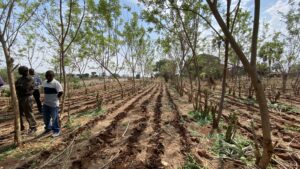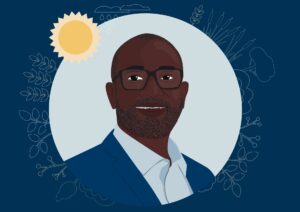New film addresses water crisis
The growing water crisis is humanity’s next big challenge. SIWI has launched a new film, distributed through Reuters, to describe how water is linked to critical issues like climate change, extreme weather and food security. There are solutions – but we must act now.

Many people are still unaware of how crucial water is for societies, businesses and ecosystems. This lack of understanding means that decision-makers often don’t have sufficient knowledge to create more resilient societies. A key priority for SIWI in 2019 is therefore to contribute to a better understanding of what is really at stake.
In a new film, Towards a water wise world, SIWI explains how the growing water crisis will change the way we live and do business. The film is distributed through the world-leading news agency Reuters in partnership with the UN SDG Hub, as part of an effort to increase awareness of the 17 Sustainable Development Goals. Most of them are strongly linked to water.
“Everybody will need to change – this is about our survival,” says Torgny Holmgren, Executive Director of SIWI.
The film talks about important and worrying trends:
- In 2030, half the global population will live in a water scarce area and global demand for freshwater will exceed available supply by 40 per cent. The result will be increased competition which could lead to conflicts.
- Climate change will cause more frequent extreme weather events like floods and droughts.
- Rainfall is becoming more and more unpredictable, increasing the risks of crop failure and hunger.
- In a warmer world more people will suffer from infectious waterborne diseases.
- Water scarcity is increasingly seen as both a security risk and a business risk.
But Towards a water wise world is also a film with a hopeful message. There are solutions. SIWI works with governments, organizations and businesses to develop smarter policies and better practices. It is for example not sustainable that 80 per cent of wastewater is discharged untreated.
“We focus on water governance – who gets what water, when and how. Since water is a limited resource, it must be used efficiently and fairly,” explains Therese Sjömander Magnusson, Chief Operations Officer at SIWI.
Another top priority is to make societies and food systems more resilient to extreme weather and unpredictable rains. Traditional and nature-based solutions must be combined with modern engineering. The shift also creates new opportunities for innovative companies.
“Water is rising on business agendas. Risks, resource management and consumer demand are elevating water to a core business concern. Many industries now assess their water footprint and risk exposure,” says Nicolai Schaaf, Programme Manager at SIWI.
SIWI wants to contribute to this change through the spread of knowledge and ideas between many different actors. The film Towards a water wise world is one way of increasing the understanding of what needs to be done, another important tool is the free online water course SIWI launched earlier this year, Water – addressing the global crisis, which is still open for enrolment.
“Water challenges are truly global. We must all join forces to find new water wise solutions,” Torgny Holmgren says.







